August, 1949
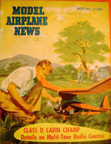
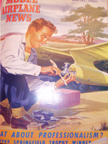
Model Airplane News Cover for August, 1949 and March, 1950
Tribute to Gas-Powered Free Flight
Drawings by Jo Kotula
Click to Enlarge
These two covers are a tribute to gas powered free flight models. Competition is divided into classes based on the displacement of the engine to keep planes approximately equal in power. Wing area is constrained by a ratio to the area of the "support structure." This constraint leads to the unusual design where the wing sits on a "pylon". For a given class, the amount of fuel is constrained to allow the engine to run for a maximum time of 7 to 15 seconds, with larger engines running for smaller times.
Separate events are held for two take-off methods: Hand launched (HL) and "Rise Off Ground" (ROG). A considerable amount of energy is expended in ROG takeoff, so the two methods are not comparable. In turn, HL and ROG exert constraints on model design. Some are obvious (landing gear) and others are more subtle.
Regardless of size and launch class, the object is to have the model fly as long as possible. For this reason, free flight models are part airplane and part glider. Competitors seek to get their model as high as possible during the power phase and then hope to hit favorable air currents to keep the model in the air. However, the model may not have any movable controls that can be invoked during the flight. Generally, competitors set the rudder for a clockwise turn and the aircraft spirals upward to its gliding height.
In order to keep the contest within a realistic time frame, maximum times (on the order of 5-9 minutes) are set. Models must be equipped with a dethermalizer which triggers the elevator into a "down" position bringing the plane to the ground. The most common dethermalizer is a fuse that burns through a string that restrains a spring-loaded elevator.
The August, 1949 issue shows a "Rise-Off-Ground" competitor while the March, 1950 cover shows a "Hand-Launched" free-flight model. From rough comparison of the engine with the modeler's hand we conclude that the August, 1949 issue illustrates a "Class B" model while the March, 1950 issue is a "Class D" model. (Subjective judgement only...)
Here are some photos from the approximate 1949-1950 time period:
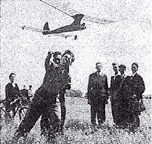
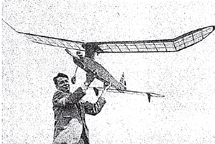
Free Flight Models circa 1949
Click to Enlarge
The August, 1949 issue presents the plans for a Class B competiotor named Vixen that illustrates many of the design characteristics of free-flight models. Here are the plans:


Free Flight Model "Vixen"
Click to Enlarge
Here is a compilation of model aircraft video from this period.
Click here to read the complete rules for Free-flight competition.
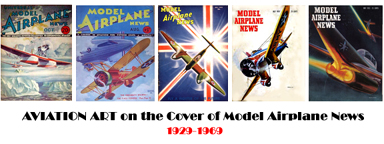
Click to go back and select another cover.
Counter for the Entire Site (not just this page..)
Home | About Lindy | Last Week's Reviews | Upcoming Events | 1940s Collecibles
The Guide - Establishments - Travel - Accessories
Music | Links | Photo Gallery | Extras | Contact